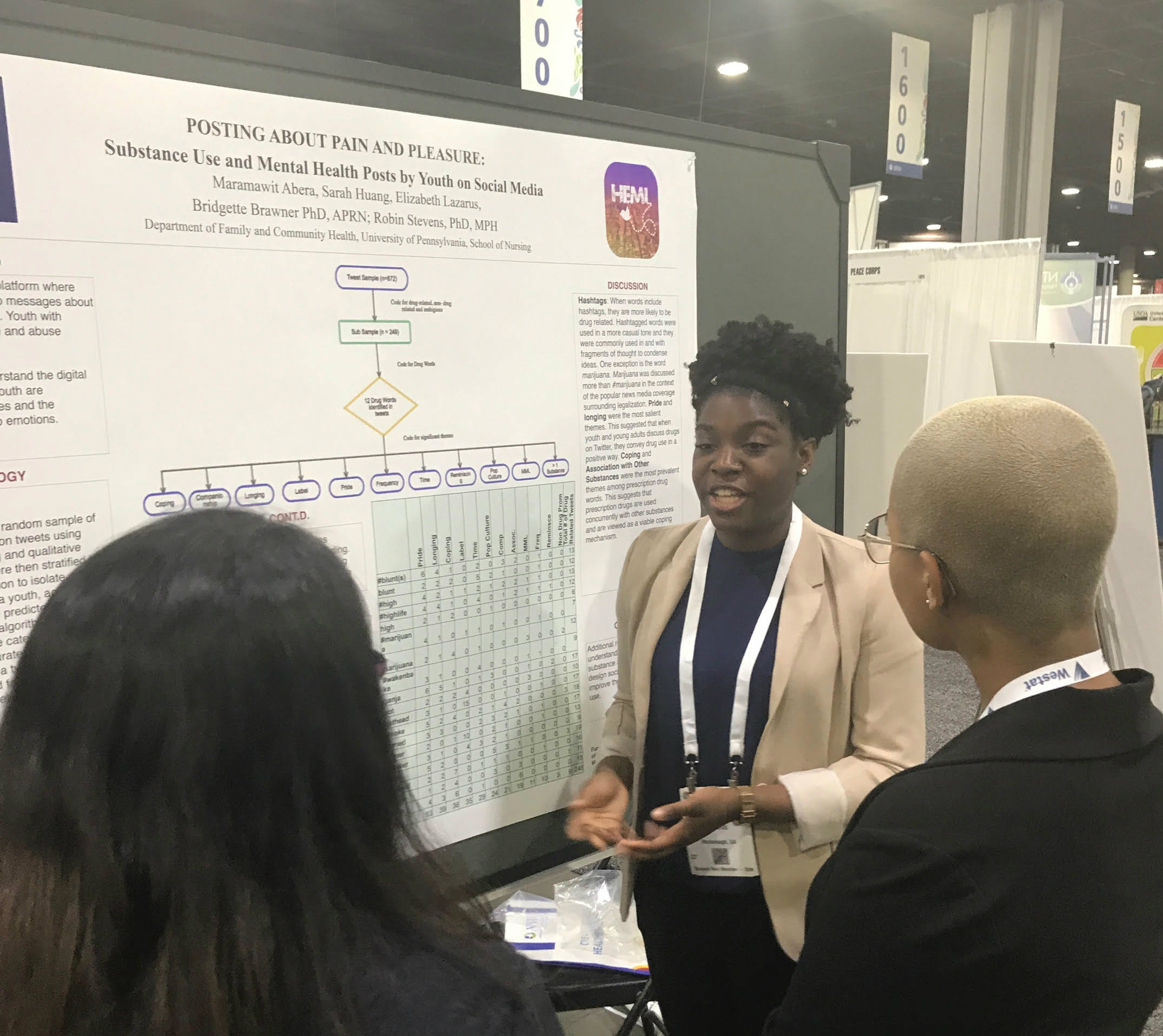OMNIA Q&A: Social Media Highs and Lows
Elizabeth Lazarus, C’20, conducts research on how drug users express feelings related to their usage on Twitter.
How can social media be used as a tool to understand and impact public health? This is one of the questions that Elizabeth Lazarus, C’20, set out to answer in collaboration with peers Maramawit Abera, C ’18, and Sarah Huang, NURS ’19. They designed their own qualitative study with support and feedback from their faculty mentors Bridgette Brawner, Assistant Professor of Nursing, and Robin Stevens, Assistant Professor of Nursing and Director, Health Equity and Media Lab. Lazarus presented their findings at the Center for Undergraduate Research and Fellowships Fair. Here, we talk to Lazarus about her research experience and the surprising ways drug users use Twitter.
You and your peers designed your own research study. What were you trying to gain insight into?
We wanted to examine and understand how youth are communicating about drugs on social media, specifically Twitter. Our faculty mentors are very interested in mental health and how that relates to risk-taking behaviors like drug use. The hypothesis is that people using drugs may also have mental health disorders or not feel positively about themselves. With that foundation in mind, we decided to look at how drug words and words related to feelings or emotions were connected. More precisely, we wanted to analyze what emotions Twitter users who are self-proclaimed drug users were expressing as it relates to their usage. Our focus was a little different than mental health, but related.
How did you conduct the research?
Together, we coded and qualitatively analyzed a subset of Twitter data geo-located in Pennsylvania between 2011 and 2015. The data looked at Tweets from a random sample of 1 percent of 33 million tweets. Age algorithms predicted 10,056 users were aged 25 and under. Our faculty mentors had already coded an algorithm to identify drug-related words, but we had to go in and ensure the tweets being pulled were truly drug-related. For example, a term like “high” could be drug-related, but it could also mean "high" as in superiority or position. Or, people could be using the hashtag #marijuana, not to talk about smoking it themselves, but instead to have a political conversation about legalization. So, it was important for us as student researchers to manually identify tweets based on three identifiers: drug related, non-drug related, and ambiguous. The coding was compared and a group consensus was achieved. Then, we identified the emotional themes that were most prevalent in the drug-related tweets. We came up with twelve thematic expressions of emotion, but four showed up the most: companionship, longing, coping, and pride. We then attached those themes to each tweet in order to gain insight into how drug users express their feelings about their substance use.
What was the most prevalent emotion being expressed?
We found that pride was the most salient emotion expressed on Twitter. People who are talking about drugs on Twitter are confident in their drug use. They're not hiding it. In fact, they want people to know about it.
Were you surprised by that finding?
I was surprised by the sheer amount of positive tweets about drug use. You would think it’s a behavior that someone would not want to share, but it’s incredibly prevalent.
How do you hope this research can be applied?
My hope is that our work will help in the creation of an intervention for drug users using social media. We have helped define the context of how drug users express themselves about their usage. So, hopefully, that makes creating an intervention to decrease those behaviors easier.
What’s next for this research?
My team and I presented our results and conclusions to our faculty mentors, as well as to an audience over Family Weekend. Then, we were invited to present for the American Public Health Association, which was exciting. Currently we are working on a content analysis paper so that eventually our findings can be published. Though the PURM program is only for the summer, I am grateful to still be working with Dr. Brawner and Dr. Stevens. Both have been critical in helping me decide on my major: health and societies.



